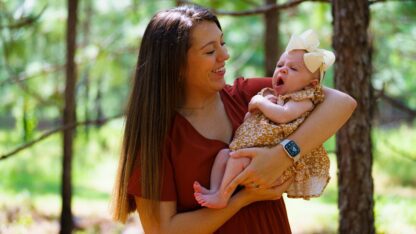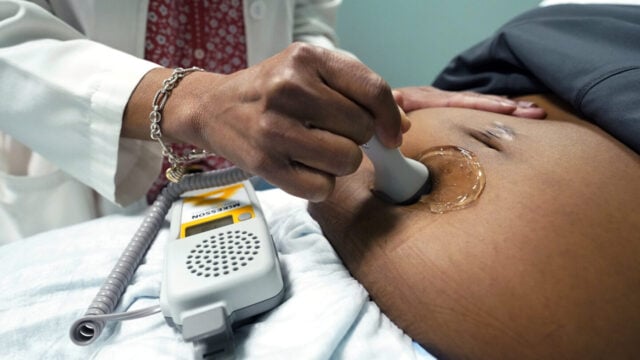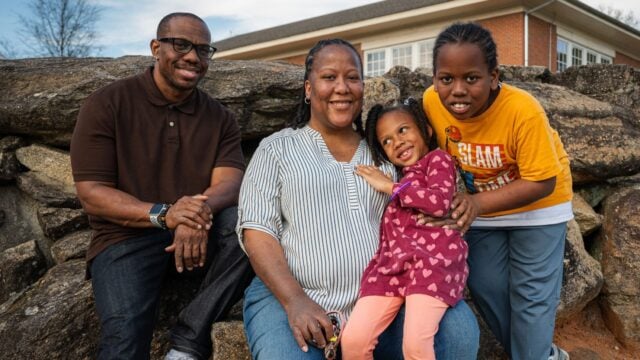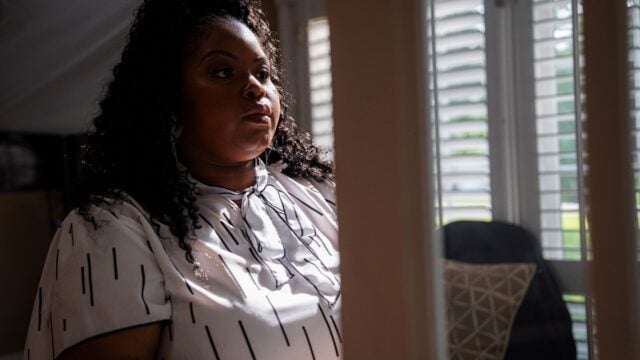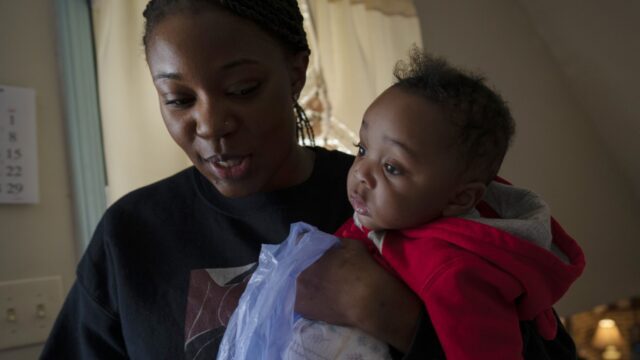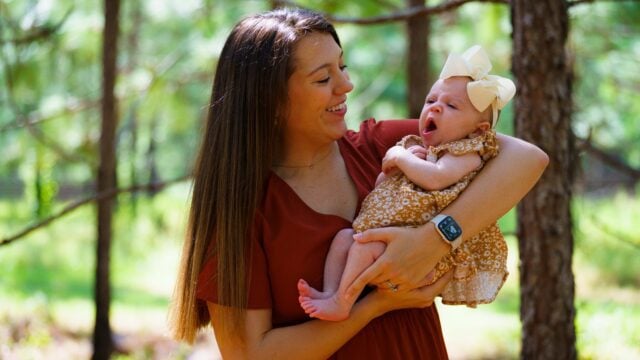On a quiet, leafy block southwest of downtown Atlanta, Ponchitta Perez Davis parks outside an apartment building, gets out and walks around to the back of her SUV.
“Hey girl, hey, girl!”
Perez Davis, who everyone calls “Perez,” grabs some shopping bags and waves to Teea, who has appeared on her front porch. To protect her family’s privacy, WABE is not using Teea’s last name.
Perez is a family support specialist with the Atlanta Center for Black Women’s Wellness. On this day, she is here to see Teea and her 18-month-old daughter Nola.
Inside the apartment, Perez hands Teea a few boxes of diapers and some children’s books from one of her shopping bags.
Teea sits on the couch, her long braids gathered up into a bun. Perez settles crosslegged on the carpet in front.
Toddler Nola gets busy rummaging through her toy box and bringing toys over to show Perez. She hands Perez a doll.
“Oh, she is so heavy,” said Perez about the doll. “Nola, sit down with me, OK?”
Perez also has a background as a doula and a lactation specialist. She asks Teea about Nola’s recent visit to the pediatrician.

First-time mom Teea, 25, said the doctor gave Nola a checkup along with a series of shots.
Perez notes the immunizations in a folder. She does this every other month.
Teea and Nola are among dozens of families Perez sees each month through the Center for Black Women’s Wellness home visiting program until babies are 18 months old.
“Trust is essential. If I’m opening up my home, I’m opening up my heart, essentially. And I’m saying, I’m going to be vulnerable in this moment and I’m going to accept help. That’s hard for people to do, but once you do it, I think then the stress level comes down.”
The Center For Black Women’s Wellness President and CEO Jemea Dorsey.
Pregnancy and the months after childbirth can be risky for new moms. Georgia has one of the highest maternal mortality rates in the nation, with the state Maternal Mortality Review Committee finding roughly 85% of pregnancy-related deaths are preventable. Black Georgians face the highest risk for pregnancy complications. They are also more likely to face barriers to accessing timely, respectful care, according to the United States Centers for Disease Control and Prevention.
Home visiting programs are designed to address these disparities by offering regular in-home visits by a maternal and child health specialist trained to ensure moms, dads or other partners, and babies have what they need to stay healthy.
During her visit with Teea and Nola, Perez checks: do they have enough to eat? Do they have transportation to their medical appointments? Is Nola on track with child development milestones? Is their Medicaid coverage still active? And she connects Teea to any additional support they need.
Perez also keeps an eye on Teea’s mental health and encourages her to think about her future.
“To know how she’s sleeping. You know, making sure mommy is doing what she has to do and to see what her goals are,” Perez said, turning to Teea. “Anything you want to do? Talk to me.”
Teea said she’s hoping to get licensed as a hairstylist and eventually do hair full-time.
“I want to get back into hair, sign up for school, get a good job, you know, long-term goals,” Teea said.
Perez also pushes her to focus on her more immediate parenting achievements.
“Let’s talk about short-term goals. You went to the doctor, you took her to the doctor,” she said. “Those need to be celebrated, OK?”
Home visiting is nothing new. It’s been around for many years in almost every state across the country. Evidence shows its model of one-on-one family support promotes healthy pregnancy, children’s readiness for school and a host of other health benefits.
Georgia public health agencies have expanded access to home visiting programs, with support from the General Assembly and federal funding through programs such as Healthy Start.
The visits can catch warning signs for maternal mortality and morbidity in Black women before their conditions worsen, said Center for Black Women’s Wellness President and CEO Jemea Dorsey.
“Making sure they can advocate for themselves,” Dorsey said. “We want to make sure that we are living in a society where childbirth is safer and more respectful for Black women. That is the key right there.”
But home visiting programs are labor intensive. The nonprofit center largely funds the work of Perez and other home-visiting workers using a mix of fundraising events and government grants.
She said they are most effective when used as one tool, along with comprehensive and preventive healthcare services.

To be eligible for the center’s home visiting program, communities must have an infant mortality rate at least 1.5 times the national average.
In Georgia, compared to white babies, babies born to Black Georgians are almost twice as likely to die before their first birthday.
Listening to women’s concerns during and after pregnancy can reduce family stressors and increase maternal and child well-being.
“We all need our village,” said Rosalind Hill, maternal health equity program manager at Atlanta Healthy Start. “But there are countries in this world who don’t need this. We would like to get to the point where it’s not necessarily something that we have to do.”
The U.S. continues to have the highest maternal death rate among high-income nations, research from The Commonwealth Fund shows.

Perez’s visit with Teea and Nola winds down.
But before Perez packs up her supplies to go, she takes out a book and invites Nola to sit on her lap to read it. Teea looks on over Perez’s shoulder as they read, encouraging Nola to turn the pages.
Nola points at a brown bear on a page and squeals with delight.
“She said, did you see it? That’s a big old bear in that door, huh? Good job, Nola,” Perez said.
Perez said Teea and Nola can keep the book. They’ll practice reading together every time she visits.
“We’re building her vocabulary up and also building a great bond with her and her mom,” she said. “It’s quality time.”
Soon, Nola is going to be a big sister. Teea and her partner have another baby on the way.
Teea said it’s reassuring to know Perez is just a phone call away.
“24/7, seven days a week. Every time I call her, good or bad,” she said. “Everybody needs help. Parenting ain’t easy.”
Teea said she knows Perez will be there for her during this pregnancy and beyond, every step of the way.
Perez said she loves working with women before, during and after pregnancy.
“Women and babies are dying during childbirth. I talk to them about the statistics. Also, I live in the community I serve. Knowing and understanding the demographic of clients that we serve,” she said.
She relates to her clients’ struggles, too. She was 15 years old when her first child was born.
“These young ladies are me. I never forgot that feeling that I felt being that little young girl. Nobody helped me. And I just think that we all deserve respectful care.”
This story is part of our series Missing Moms: Inside Georgia’s Maternal Health Crisis. Jess Mador’s reporting is part of a fellowship with the Association of Health Care Journalists supported by The Commonwealth Fund. It is produced in partnership with the Georgia Health Initiative.



